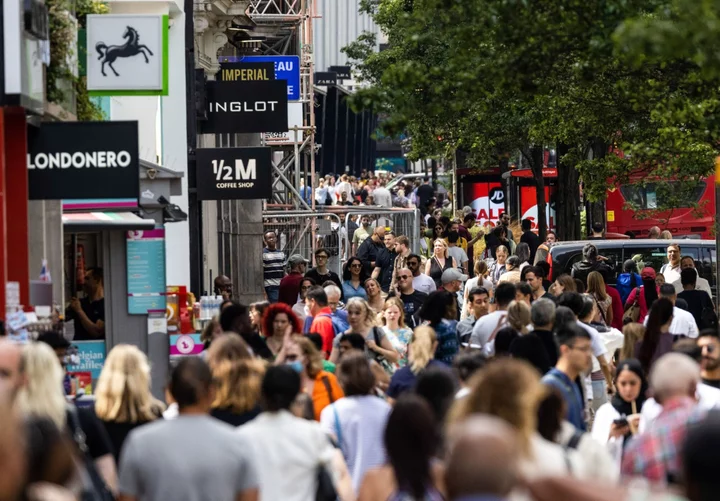Britain’s hottest June on record helped lift retail sales, pushing consumers into department stores and supermarkets to spend on everything from food to furniture.
The volume of goods sold in stores and online rose 0.7% last month after a 0.1% gain in May, the Office for National Statistics said Friday. Economists had forecast a 0.2% month-on-month increase.
The figures suggest the UK economy is weathering strong headwinds on consumer spending from soaring prices and interest rates. Those factors along with expectations that the Bank of England will keep raising interest rates have made economists cautious about the outlook.
“The recent resilience in economic activity hasn’t yet faded,” said Ashley Webb at Capital Economics. “It’s too soon to conclude that the rebound in retail sales will be sustained and that the economy will avoid a recession.”
A separate report showed the Treasury’s finances also are in better shape than expected, with public sector net borrowing lower both in May and June. The deficit for the latest month of £18.5 billion ($23.9 billion) was less than the £22 billion expected, and May’s figures also were revised down.
The pound edged up after the release, trading 0.3% stronger at $1.2904. The currency is down 1.5% against the greenback this week, the worst performing Group-of-10 currency after the New Zealand dollar.
The value of retail sales is rising faster than volumes, suggesting people are paying more to buy the same amount of goods.
The stronger data adds to the case for further interest-rate increases from the Bank of England, which is concerned that prices are still rising almost four times the pace of its 2% target.
It was the biggest monthly jump in retail sales since February, though May’s figure was revised down from growth of 0.3%. The ONS said it was driven by a 1% rise in non-food store sales after a strong month for department stores and furniture retailers. Summer sales and increased footfall due to the hot weather helped boost spending.
“Retail sales grew strongly, with food sales bouncing back from the effects of the extra bank holiday, partly helped by good weather,” said Grant Fitzner, ONS chief economist. “However, these were partially offset by falls in fuel, garden centers and clothes shops.”
Sales fell 1% compared to a year ago, the smallest fall on an annual basis since the start of the war in Ukraine last year started to erode shoppers’ spending power.
The warmth also helped sales in supermarkets rebound in June, growing 0.7% after a fall in May.
June’s increase was “due to one-offs,” said Gabriella Dickens, senior UK economist at Pantheon Macroeconomics. She’s “cautiously optimistic” about the second half of 2023.
“We expect sales volumes to rise further in the second half of this year, as real disposable incomes start to recover,” she said.
While retail sales have held up better-than-expected in 2023, the outlook is darkening for consumers as many brace for a large jump in their monthly mortgage repayments.
The market research company GfK Ltd. said on Friday morning that consumer confidence slipped back for the first time in six months in July. The survey showed confidence draining on personal finances and the general economic situation amid fears of a tougher clampdown on inflation by the Bank of England.
The cost of home rentals also surged to a record, according to a report from the property portal Rightmove. In London, tenants are now being asked to pay an average of £2,567 ($3,310) a month — up 13.7% from a year ago and by 28% from the same time in 2019 before the pandemic.
“Reality has started to bite and, as people continue to struggle to make ends meet, consumers will pull back from spending,” Joe Staton, GfK’s client strategy director, said. “It’s bad news. People are feeling economic pain.”
Read more:
- London Home Rental Prices Hit Record as Demand Outstrips Supply
- UK Borrowing Undershoot Raises Hopes for Tax Cuts Next Year
(Updates market reaction)









